What makes a retirement haven feel like “home”? Of course, important factors such as the cost of living, the state of the healthcare system, and visa requirements all contribute to how well you settle into life abroad—but what about the building blocks that help expats create community and integrate into local life?
Things like the friendliness of the locals, the size of the expat community, the availability of activities on offer, and how easy it is to make friends all work to create an environment in which expats can feel safe and welcome.
And while becoming immersed in a new culture, exploring the unknown, and navigating a new language can be a huge part of the fun and adventure of moving abroad, having access to home comforts and people who speak English can help transform an overseas destination into a forever home.
For International Living’s 2022 Retirement Index, we’ve looked at the countries where it is easiest to fit in—locations where you can have your adventure and be a part of a community at the same time. The winners of this year’s “Fitting in and Entertainment” category are…
#5 Portugal
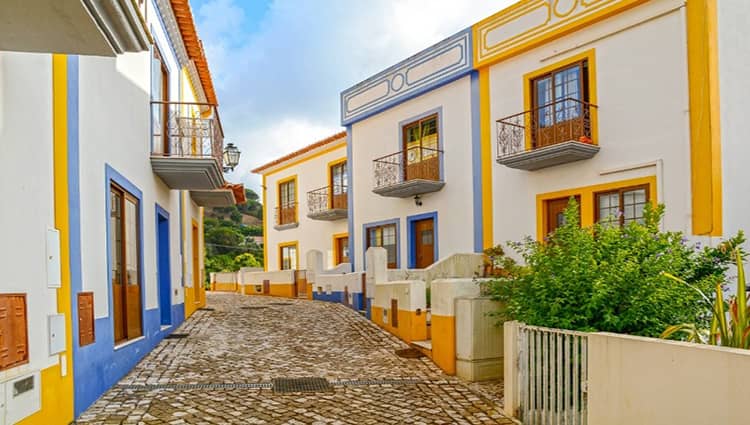
Europeans come in all shapes, sizes, skin tones, and hair colors—everyone fits in here. With a large population of English speakers from the U.K. and other parts of Europe, the Portuguese are accustomed to hearing English spoken. And with well over 600,000 foreigners who already call Portugal home, it’s no wonder.
“Fitting in here has been far easier than many other countries we have lived in or visited,” says Terry Coles, IL Portugal Correspondent.
Long an under-the-radar destination, today Portugal’s low cost of living, high quality of life, reliable infrastructure, varied climate, world-class healthcare, and high degree of safety is attracting foreigners to this tiny country in increasing numbers.
Historic towns, picturesque landscapes, medieval villages, and pristine beaches dotted with craggy rock formations decorate the landscape. Add to that an abundance of Old World charm, complete with plenty of North American comforts.
With miles of coastline, beach lovers can enjoy surfing, body boarding, windsurfing, fishing, swimming, and sunbathing. For those that prefer to stay inland, there are areas that offer hiking, biking, jogging, and walking trails. Whether golfing, playing cards with friends, bowling, yoga, or exercise groups are your passion, there are expats here to do it with. Join others who volunteer at animal shelters, organize a book exchange, help at local festivals, charity shops, and more.
“The first time we looked at a house to rent here in Portugal, we were greeted with double-cheeked kisses by a short, chubby, older woman wearing a house dress. Although we had never met before and she spoke no English, she welcomed us with open arms. As we looked around her house, my husband, Clyde, and I had an immediate feeling that we were home. This is where we were meant to be,” says Terry.
“This is typical of how foreigners are treated in Portugal. The people are warm and wonderful, always willing to lend a hand or offer fresh vegetables and fruits from their garden. It doesn’t matter if you don’t speak Portuguese or they don’t speak English because communication happens using smiles, hand gestures, hugs, and kisses.”
Portugal has a great infrastructure with perfectly paved roads, crystal-clear water to drink, high-speed internet, WiFi in many public places, shopping malls galore, and English is spoken by many. Some television shows that were originally broadcast in the U.S. in English are shown here with subtitles. Movie theaters offer first-run films, shown in their original language (usually English) with Portuguese subtitles. The price of a movie is about $7 for a regular ticket and $4.50 for a senior citizen.
Supermarkets feature an array of fresh fruits and vegetables, including organic. Larger supermarkets include bio sections for specialty items like gluten-free, vegan, vegetarian, as well as fat- and sugar-free options. Chinese stores, similar to U.S. department stores, offer everything from clothing to nuts and bolts at discount prices. And there is always Amazon for those hard-to-find items. When ordering from Spain, Germany, and France items come quickly, sometimes the next day.
Several expat hotspots make fitting in even easier and are where one could easily get by knowing only English, at least at first. In the center of the country, the bustling city of Lisbon, Portugal’s capital, sees plenty of tourists. English is widely spoken, at least among the younger population. With over 60 museums, tons of restaurants featuring all types of gastronomy, live theater in English, and plenty of expats who already have succumbed to its charms, it would be easy to blend into city life there. Nearby coastal destinations like Cascais and Estoril have long been high-priced havens for North Americans seeking modern, coastal lifestyles.
Drive south a few hours to the ever-popular Algarve region. Holidaymakers from the U.K. have long frequented this gorgeous, coastal gem that accepts foreigners with open arms. It’s almost detrimental to those trying to hone their language skills, since so much English is spoken in this area. This is the vacation hot spot of Portugal with water parks, golf courses, miles of beaches, gastronomy galore, and plenty of summer tourists. But the rest of the year life in the Algarve is tranquil and sweet, with the mildest winter temperatures in Europe, and plenty of businesses remaining open.
To the north, Porto, Portugal’s second city which actually lent its name to the country itself, has become another expat haven. A lively university culture, plenty of tourism, restaurants, and shopping make fitting in super easy. Not to mention the famous port wine just waiting to be sipped with friends at corner cafes. Much of Portugal is enjoyed outdoors at sidewalk cafes, restaurants, and outdoor sports venues. People-watch to your heart’s content, shop for bargains or designer brand names, or enjoy some of what Portugal is known for, its cuisine.
As an example of how welcoming Portugal is to foreigners, the government offers FREE language lessons at all levels, from beginner to fluent. These are held at local schools and run according to the school-year calendar.
#4 Panama
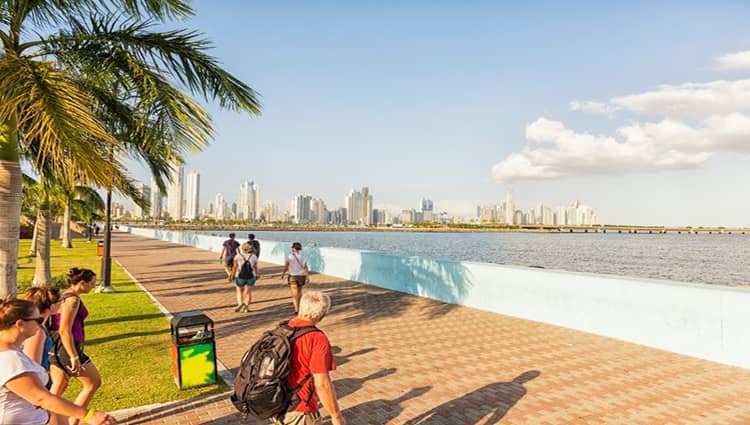
“I have wonderful memories from my first trip to Europe, in 1997. My destination was the tiny commune or municipality of Casorate Sempione. Everywhere I went in that northern region of Italy, the population was pretty homogenous. As the only brown girl for miles, I got more than a few curious looks,” says Jessica Ramesch, IL Panama Editor.
“The attention wasn’t negative at all—it was often flattering—but blending in was out. Now I live in Panama, and with my black hair and brown skin, a lot of people simply assume I’m a local mestiza. (Both my parents were from India, actually.)
“But did you know that it’s easy to fit in here no matter what you look like? That’s part of the reason Panama does so well, year after year (after year) on International Living’s Annual Global Retirement Index.”
Panama is incredibly international, home to communities from the U.S. and Canada, as well as myriad other countries. And that’s been the case for more than 100 years. So, there are Panamanians who might look Dutch or Jamaican to you, but whose families have been here for generations.
The U.S. had a large military presence in Panama from the early 1900s until 1999, when the last military bases—and the Panama Canal—reverted to the Panamanian administration. Rather than return to the States, many chose to stay here. And in the years that followed, Panama’s fame as a retirement destination grew. (We at International Living certainly had a hand in that, having spotted Panama’s potential very early on.)
A booming economy attracted non-retirees, as well. We saw influxes from Spain and France, China and Korea…go-getters from across the globe seeking out new opportunities in the New World. Some came here to start small businesses of their own, others were sent by the multinationals they worked for. And some left after a few years, while others stayed and started families. It’s all part of the natural ebb and flow of an international destination.
“I live in the capital, Panama City, where I found a large Indian community and—thank goodness—an Indian grocery that keeps me in chutneys and spice blends. There are more than a few Asian groceries where I stock up on things like sesame oil and rice noodles. Meanwhile, the upscale Riba Smith supermarket chain sells a wide selection of imported products alongside the beautiful local produce,” says Jessica.
“Brie and gorgonzola from Europe, prime rib and sausages from the U.S., fine wines from South America and beyond, and the list goes on. You’ll hear customers speaking French, English, Arabic, Chinese…no one bats an eyelash. Ask an employee for help finding tofu or pumpernickel—they aren’t fazed. (I did have to learn the term for pumpernickel…it’s called pan de centeno here…but nowadays you can use Google Translate to look up anything.)”
Of course, many of the new expats coming to Panama don’t want to live in the bustling capital. One of the most popular retiree destinations in the world is the green and serene mountain haven of Boquete, in Western Panama. Its quiet, cottage-lined lanes and breathtaking vistas make for quite a change after the city’s loud traffic and gleaming skyscrapers. In fact, many are surprised to find homes reminiscent of Swiss chalets, with steeply pitched rooflines despite the obvious lack of snowy weather.
“In the 1900s, settlers arrived here from as far afield as Sweden, Germany, the former Yugoslavia, and, yes, Switzerland. Hence the architecture. And many of them still have descendants in and around the Boquete Highlands, as evidenced by prominent local names like Janson. The Janson family farm produces my favorite Panamanian coffee, I highly recommend sampling it.
“In a few months I’ll be moving to another popular expat destination, the growing beach hub of Coronado. Just an hour’s drive from Panama City, Coronado has a unique history. Unlike Panama’s colonial towns, Coronado was developed privately.”
The tale goes that in 1894, a young man named Gustave Eisenmann traveled from Louisiana to Panama to work for his uncle. Intrigued by rumors that the government planned to develop the coastal region outside Panama City, Gustave convinced a friend from Panama’s Eleta family to partner with him. Together, they purchased the land that would eventually be known as Coronado.
“If only Gustave could see it now, its many meandering lanes filled with homes that range from attractive little cottages to sprawling family estates. I chose one of the few apartment buildings, where I’ll have a bit of added security and access to amenities like a gym and several pools. I’ll also have views of the mountain known as Cerro Campana, the Pacific Ocean, and a Nicklaus-designed golf course that has attracted many Panamanians and expats alike.
“During my last visit, I drove around, showing my cousin around town. We passed a woman walking with her child and a couple in a golf cart. I waved, as is the custom in Coronado, and everyone cheerfully waved back.
“Were they expats or locals? Who knows…it’s impossible to tell until you talk to people and ask them where they’re from.
“No matter. The one thing I do know is that I’m going to fit in just fine.”
#3 Malta
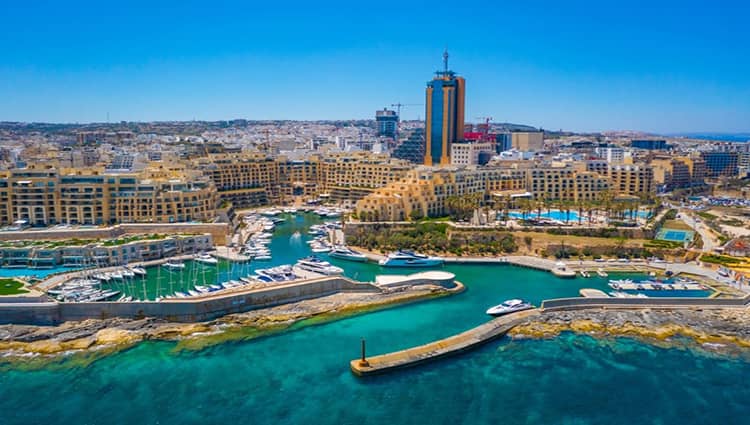
Friday night, St. Julian’s, a seaside enclave in the middle of Malta’s bustling metropolitan zone. What to do? Well, turns out pretty much anything you can imagine.
For a country this small (the entire island is about the size of Memphis), there’s quite the smorgasbord of possibilities. Entertainment abounds, and fitting in here—an English-speaking country where expats comprise 20% of the population of 500,000—is easy.
“In Malta, I was friends with a Norwegian, a Dane, an American, and several Swedes. In terms of restaurants, there are more than I cared to count—everything from Italian to seafood, Swedish home cooking to a proper English pub to excellent sushi. I settled on Greek one night; it was fabulous,” says Jeff Opdyke, editor of IL’s Global Intelligence Letter.
“Several times during my trip, I popped into Balluta Bar, a local sports bar, just to have a look around and to grab a cold, local beer on a warm, muggy summer’s night. I also stopped by an Irish pub to write and to grab a cider while watching a cricket match or the English Premier League.”
Along Balluta Bay—about a 30-second walk from Balluta Bar—a seaside promenade bobs and weaves for a couple of miles along the Mediterranean. It’s rich with al fresco eateries, bars, ice-cream shops, as well as small parks, beaches, and several water polo clubs where local teams play their league games in seaside pools or courts built right into the sea.
“Movie theaters I passed were playing the latest blockbusters. In nearby Paceville, dance clubs were thumping. Kids and families were walking into Eden Super Bowl for either kids’ night or, maybe, league night.
“One evening, I took a five-minute ferry across the bay to Valletta, the country’s ancient capital, and spent a couple hours strolling through the old, fortified city, where massive stone walls date to the mid-1500s. I passed the Royal Opera House and Teatru Manoel, a small, performing arts theater built in the 1730s by a Grand Master of the Knights of Malta.”
And for a city this size, it hosts a crazy number of museums dedicated to art, war, archaeology, the Knights of Malta, postal issues (actually, really interesting), even the sieges that defined this island’s long history.
“An American I was meeting had reserved a table for us at a small Italian restaurant on Straight Street, famous locally for once serving as home to the area’s collection of brothels. Like almost every restaurant in Malta, the tables were set up outside, right on the street, so that diners can enjoy the cooler evening air and the ambiance of a city alive in the evening,” Jeff says.
“After dinner, I went for a walk and stumbled upon a festival underway. Everyone in Malta will proudly tell you that this strongly Catholic country has more than 360 churches, one for almost every day of the year. Just about all of them celebrate some saint or some feast during the year, so there’s pretty much a festival every week, with small parades and the streets strewn with banners that hang like medieval tapestries.”
All around the country are amazing beaches and a wealth of outdoor activities. Hiking trails exist all over the main island of Malta and its much tinier sister island of Gozo. They cut through the scrubby, dry inland; they run along the seashore; they test your nerve as they skirt along the edges of monolithic seaside cliffs.
There is a vast array of historical sites and stunning geography to explore. Several ancient forts are in the metropolitan area, some with beautiful gardens looking out over the sea.
“The medieval citadel in Mdina, Malta’s first capital, is simply stunning, and a place I would visit over and over just to explore the winding streets and take moody photos. At night, the entire place is lit with lanterns, lending it an historically accurate ambiance,” says Jeff. “Not far away from Mdina are pre-historic, megalithic temples older than Stonehenge and Egypt’s Great Pyramids.”
To the north, on the island of Gozo, life is much quieter and far less congested. Victoria, the main city, has its own medieval citadel and a collection of museums. Gozo, however, is mainly an outdoorsy place of beaches and hiking, swimming, snorkeling, and diving (diving schools are everywhere in Malta).
“No matter where you happen to be in the country, one thing is certain: You’re going to fit in. And in short order you will quickly slip into the Maltese vibe. Given that their country has been overrun by numerous conquering nations over the centuries, the Maltese are pretty much welcoming to everyone these days,” says Jeff.
“Just show up, maybe learn how to say ‘welcome’ in Maltese (merhba) and you’re well on your way to settling into a Maltese life.”
#2 Costa Rica
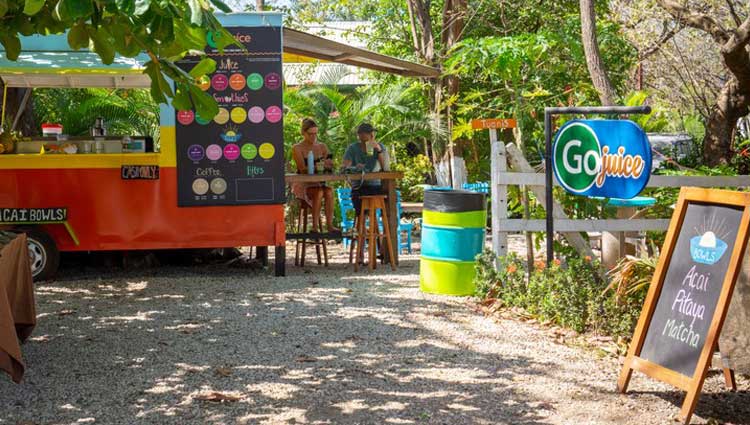
Even for those who have done their due diligence before a move to a foreign country—researching healthcare, real estate, weather, cost of living—there is still one wildcard: fitting in. Although this is often an afterthought in planning, it can make or break your expat experience. After all, choosing to be alone is one thing. Loneliness is a whole different animal.
Extended family, friends, and social and physical activities play a huge part in our health and wellbeing. So, it is understandable that you will miss these connections when you leave. It is perfectly normal to feel a bit of angst pre- and post-relocation. The good news is, compared to many countries around the globe, Costa Rica consistently ranks highly in terms of ease of fitting in.
There are several factors working in your favor when seeking out new friends in Costa Rica.
Firstly, there are a good number of expats already living in almost every desirable corner of the country. North American and European expat pioneers have been discovering Costa Rica for the last several decades. In fact, International Living has been covering relocating to, investing in, and retiring in Costa Rica since the magazine’s inception in 1979. These pioneers have been paving the way for retirees and adventure seekers ever since.
According to the U.S. State Department, there are over 70,000 U.S. citizens residing in Costa Rica. There are thousands more who are part-timers, vacation homeowners, or visiting investors. These communities make it easy for new arrivals to meet new friends who speak the same language and share the same customs. These people on the ground have already been through the adjustment period and, for the most part, will be very helpful. When they arrived, they were also in the same position of seeking new friendships in a foreign land.
Secondly, it is not just other expats who will be great resources. Costa Ricans, or ticos, are known for their warm and welcoming personalities—part of the pura vida culture.
“I highly recommend that you learn some Spanish (no, you don’t have to be fluent) and reach out to your tico neighbors,” says Kathleen Evans, IL contributor in Costa Rica. “After all, fitting in is not just about living in a gated community with a bunch of people from your home country.”
“Having Costa Rican friends greatly enhances your expat experience. You will quickly learn more about the local food and traditions, bringing on a whole new level of international awareness. Don’t be surprised when your new neighbors invite you to their child’s birthday party or when they surround your car when it breaks down in order to help you fix it. They are simply lovely people that way. Plus, it never hurts to have an interpreter friend if your command of the Spanish language is challenged. It may even bring on an increased level of safety when locals are looking out for you.”
Thirdly, it requires almost no effort to find activities to keep you out there meeting new people, as well as exercising your body and your brain. If you shop at local stores and markets, it is fun to meet the vendors and owners who will make time to chat with you. Every sizable town and city host a weekly feria or farmers’ market.
“This is always a great opportunity to stock up on produce, sundries, bread, etc., but also to socialize with your local community. It is as much a social event as a shopping trip,” says Kathleen.
If you like yoga and meditation, you’ll be pleased to find many guides and teachers. The great outdoors will open up to you in new ways. You can find your surfing or diving tribe, take up mountain hiking, join biking groups, or pickleball and tennis teams. Looking for a little less activity? Creative classes for painting, guitar, cooking, Spanish, salsa, and woodworking are found in most of the sizeable towns. Many communities offer trivia night, live music, poker or board games, and wine or beer tastings.
“Volunteering is also a great way to meet new people and do something rewarding with your time,” Kathleen recommends. “There are countless opportunities to help your local community in Costa Rica, such as working at an animal sanctuary, helping with beach clean ups, or volunteering to teach English/computer skills to kids. Retirement does not require you to rock in a hammock with a book—unless you choose to!”
You can find social groups that host meet-up events, such as Expat.com and InterNations, and a number of regional Facebook groups for keeping updated and asking questions. Membership in ARCR (Association of Residents Costa Rica) is a great resource for navigating life in Costa Rica. Here you can find relocation resources, such as reputable lawyers and real estate agents in your area, as well as insurance recommendations. You can join these now and start forging new friendships, before ever setting foot in Costa Rica.
#1 Mexico
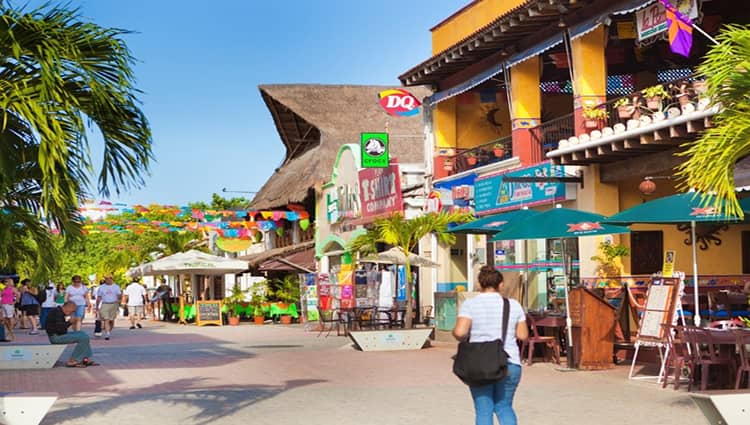
International Living’s “Fitting in and Entertainment” category isn’t just about making friends with locals and expats—it’s also about feeling at home. Can you pick up your favorite North American comforts when you need them? And how easy is it to adapt to the local culture? What will you do when you’re there—are there museums, events, and exhibitions? Are there outdoor activities? And can you catch a movie in English when you want to? When taking these factors into consideration, Mexico comes out on top with an impressive 94 points.
It’s no surprise that Mexico is a perennial winner in the category. The country has a long history—going back 60 years or more—of welcoming expats from the U.S., Canada, Europe, and beyond…not to mention it’s one of the top tourist destinations for its neighbors “north of the border.”
Every year, millions of Americans and Canadians travel to Mexico’s buzzing metropolises, fun beach resorts, picturesque natural areas, and charming colonial cities, among other destinations. And within a country three times the size of Texas, there are a lot to choose from.
“For many Americans and Canadians, Mexico might be the only foreign country they’ve ever visited. It’s cheap and easy to get to…and makes for a fun and affordable vacation,” says Jason Holland, IL Roving Latin America Editor.
“Then you must also consider that the United States and Mexico share a border. At 1,954 miles, it’s the 10th longest in the world. And there are many border crossings that are quite active. Some people cross over and back on their daily commute to work. Others cross for dental work…or shopping.”
The two countries are also big-time trading partners. The U.S. is Mexico’s biggest partner and Mexico is always in the U.S.’s top three. You’ll find plenty of U.S. stores like Walmart, Costco, Home Depot, Office Depot, even Crate & Barrel, Olive Garden, and more in Mexico—not to mention U.S. brands in local stores, U.S. movies in the cineplexes, and U.S. shows on TV.
Long story short, the Mexican people are well used to foreigners. They know their habits and customs. They know U.S. culture. They know what they like…and many vacation and expat destinations are “set up” for foreign residents and expats. In general, Mexicans are also very warm, friendly, and welcoming people.
“Many Mexicans speak English, signs and menus are in English, many restaurants cater to the American palate (although you’re never far from delicious authentic Mexican food, of course), there are rental and real estate agencies catering to expats, as well as relocation services that will help you set up a bank account, find a specialist doctor (who will most likely speak English too), secure residence, and buy a car. All that makes it easy for newcomers to get comfortable in their new home.
“Sure, there are some local ways of doing things you must learn…and it always helps to learn as much Spanish as you can, not to mention it’s also the polite thing to do. And, to be sure, you will encounter unexpected and surprising things in Mexico,” says Jason. “That’s part of the fun!”
But the point is, new expats aren’t flying blind by any means. And, of course, with its long history as an expat destination, with expat havens found in just about every corner of the country, newcomers have a whole other powerful resource to draw on when they first arrive to help them find their footing: the large and active expat community.
There are said to be 1 million+ full-time and part-time American expats in Mexico, along with about a half-million Canadians. Most of them are helpful and welcoming. This community alone can help ease your transition when you’re new to Mexico.
“And it can start even before you arrive,” Jason explains. “Online forums and Facebook groups for expats can be found for just about every haven in Mexico. It’s a great place to network, ask questions, and even make friends. I suggest you use it as a resource while planning scouting trips. You’ll get a ton of information about a community from these groups. And you can set up meetings with local expats, as well as real estate and rental agents, in advance of an exploratory trip.
“Then, when you land in Mexico, you join this expat community. And with people from all backgrounds and walks of life, you’re sure to find some folks you gel with. There is no shortage of activities to take part in: book clubs, card games, sports like tennis, golf, and pickleball, hiking, mountain biking, volunteer work…most expats find they’re busier than ever…and have more friends and social activities than ever…when they move to Mexico.
“It all adds up to a fun and fulfilling experience in your new expat adventure.”
Related Articles
Cheapest Places to Live in the World
International Living’s Annual Global Retirement Index
5 Places To Retire To With The World’s Best Climate
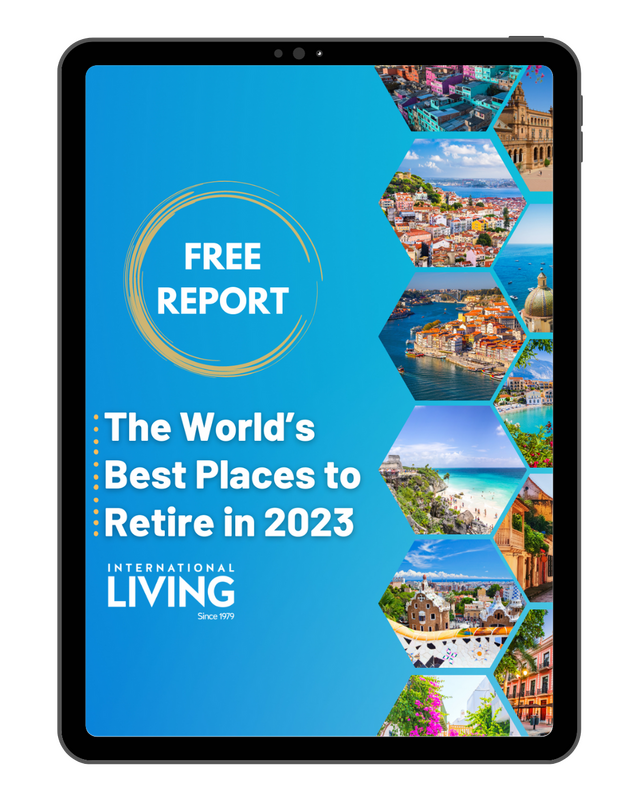
Get Your Free Report on the World’s Best Places to Retire:
Learn more about the best places in the world to retire in our daily postcard e-letter.
Simply enter your email address below to sign up for our free daily postcards and we’ll also send you a FREE report on The World’s Top 10 Retirement Havens, plus access to over 10 more free reports. Our gift to you, on our favorite destinations.
Upcoming Conferences
The Only 2024 Fast Track Panama Conference
If your dream retirement involves stunning beaches… lush green mountains… a warm climate with no hurricanes… first-rate healthcare… incredible value for money (a couple can live well on $2,200 a month)… and the World’s #1 Retiree Discount Program…
Join our Panama experts and expats in February and discover why Panama could be your perfect paradise.

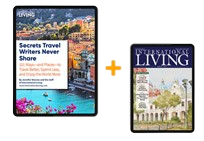

.png)